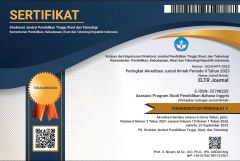THE USE OF ACADEMIC VOCABULARY ACROSS PROFICIENCY LEVELS: A STUDY OF EFL STUDENTS’ LEXICAL PERFORMANCE IN UNIVERSITY WRITING
Abstrak terlihat: 674 / PDF terunduh: 664DOI:
https://doi.org/10.37147/eltr.v4i1.63Keywords:
academic vocabulary, proficiency levels, lexical performanceAbstract
This study aims to investigate EFL students’ performance in recognizing and using academic vocabulary across three different proficiency levels of English, i.e., elementary, intermediate and advanced. A quantitative approach was employed with a cross-sectional design to examine the difference and the correlation between the two variables and 150 subjects from a private university in Jakarta, some interesting results were uncovered in this study. First, there was a significant difference in overall calculation of students’ academic vocabulary across proficiency levels, even though such a difference does not appear between intermediate and advanced level. Second, the overall calculation shows that there was a significant correlation between students’ academic vocabulary and their proficiency levels with Sig. 0.249, but surprisingly, a more detail calculation did not present any correlation at all between the variables. These results confirm that the gap among proficiency levels was not big, as majority of the students were in intermediate level of their English competence. Even though the students could perform academic vocabulary in university writing; however, almost all of them were not aware with the existence of the words, especially because the words belong to the low frequency band.
Downloads
References
Baumann, J. F., & Graves, M. F. (2010). What is academic vocabulary? Journal of Adolescent & Adult Literacy, 54(1), 4-12.
Butt, et al. 1995. Using Functional Grammar: An Explorer’s Guide. Sidney: Macquarie University.
Cohen, L., Manion, L., & Morrison, K. (2007). Research methods in education (6th ed). London; New York: Routledge.
Coxhead, A. (1998). An academic word lists. (ELI occasional publication #18. School of Linguistics and Applied Language Studies). Wellington. New Zealand: Victoria University of Wellington
Coxhead, A. (2000). A new academic word list. TESOL Quarterly, 34(2), 213-238. Retrieved from http://www.jstor.org/stable/3587951
Coxhead, A., & Nation, P. (2001). The specialised vocabulary of English for academic purposes. Research perspectives on English for academic purposes, 252-267.
Coxhead, A. (2011a). The academic word list 10 years on: Research and teaching implications. TESOL Quarterly, 45(2), 355-362.
Coxhead, A. (2012). Academic vocabulary, writing and English for academic purposes: Perspectives from second language learners. RELC Journal, 43(1), 137-145.
Cohen, N.J., & Squire, L.R. (1980). Preserved learning and retention of pattern analyzing skill in amnesia: Dissociation of knowing how and knowing that. Science, 210, 207–210
Csomay, E. (2006). Academic talk in American university classrooms: crossing the boundaries of oral?literate discourse? Journal of English for Academic Purposes, 5(2), 117-135.
Gardner, D., & Davies, M. (2013). A new academic vocabulary list. Applied linguistics, 35(3), 305-327.
Halliday, M. (2008). Complementarities in language (1st ed.). Beijing Shi: Commercial Press.
Henriksen, B. (2008). Declarative lexical knowledge. In Albrechtsen, D., Haastrup, K., and Henriksen, B., Vocabulary and Writing in a First and Second Language.Basingstoke: Palgrave Macmillan.
Hyland, K., & Tse, P. (2007). Is there an “academic vocabulary?”. TESOL quarterly, 41(2), 235-253.
Hyland, K. (2002). Options of identity in academic writing. ELT journal, 56(4), 351-358.
Laufer, B., & Nation, P. (1995). Vocabulary size and use: lexical richness in L2 written production. Applied Linguistics, 16, 307-322.
Long, M. H. (2015). Second language acquisition and task-based language teaching (First Edition). Malden, MA: Wiley-Blackwell.
Morris, L., & Cobb, T. (2004). Vocabulary profiles as predictors of the academic performance of Teaching English as a Second Language trainees. System, 32(1), 75-87.
Nation, I.S.P., & Waring, R. (1997). Vocabulary size, text coverage and word lists. Vocabulary: Description, acquisition and pedagogy, 14, 6-19.
Nation, P. (2000). Learning vocabulary in lexical sets: dangers and guidelines. TESOL Journal, 9(2), 6-10.
Nation, I.S.P. (2001). Learning vocabulary in another language. Cambridge: Cambridge University Press.
Nagy, W., & Townsend, D. (2012). Words as tools: Learning academic vocabulary as language acquisition. Reading research quarterly, 47(1), 91-108.
Waring, R., & Nation, I. S. P. (2004). Second language reading and incidental vocabulary learning. Angles on the English-speaking world, 4, 97-110.
Pallant, J., & Manual, S. S. (2016). A Step by Step Guide to Data Analysis using IBM SPSS, 6th. Maidenhead: Open University Press
Read, J. (2000). Assessing vocabulary. Cambridge: Cambridge University Press.
Schmitt, N. (2010). Researching vocabulary: A vocabulary research manual. Basingstoke, UK: Palgrave Macmillan.
Stahl, S. A., & Fairbanks, M. M. (1986). The effects of vocabulary instruction: A model-based meta-analysis. Review of educational research, 56(1), 72-110.
Paquot, M. (2010). Academic vocabulary in learner writing: From extraction to analysis. London: Bloomsbury Publishing.
Townsend, D., Filippini, A., Collins, P., & Biancarosa, G. (2012). Evidence for the importance of academic word knowledge for the academic achievement of diverse middle school students. The Elementary School Journal, 112(3), 497-518.
Undang-Undang No. 12 Tahun 2012 tentang Pendidikan Tinggi (Lembaran Negara Republik Indonesia Tahun 2012 No. 158, Tambahan Lembaran Negara Republik Indonesia Nomor 5336)
Yule, G. (2013). Referential communication tasks. Routledge.
Downloads
Published
How to Cite
Issue
Section
License
Copyright (c) 2020 Christianus I Wayan Eka Budiartha

This work is licensed under a Creative Commons Attribution-ShareAlike 4.0 International License.











 ELTR Journal,
ELTR Journal, 